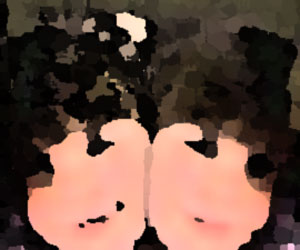Watch him step gingerly down the crumbling slope, the rocky incline that leads him to the creek-bed. Watch him as his one good head looks off in both directions, for other children, for townspeople who would prefer that he weren’t there. Watch him as he gathers water in his cupped hand and raises it to the other head’s lips: the smaller head with shriveled and mongoloid features, the one they say—and he’ll tell you the same—doesn’t work as well. This is how people differentiate, people who can bring themselves to talk about it: His one head, they say, meaning his good head, the one that works. His other head, this is what they call the one that doesn’t.
The two-headed boy has stolen an old breech-loading .22, which he uses sparingly, as he has only the one box of bullets, and limited means when it comes to obtaining another. Crouched in the scrub, he sights a jack-hare. The sun on the dying grass is like spilled honey. He holds his breath, squeezes the trigger. The jack-hare drops down like a county fair tin target. ‘That got him,’ the two-headed boy says.
‘Gobbim,’ says his other head.
Even when he’s grown they still call him the two-headed boy. See him atop the roof, swinging a hammer just as the other men do. See him up there alone at lunch time, the workers sprawled out like cats beneath the shade tree below him. This is the quiet part of the day: the middle, when everything slows and the world buzzes with the sound of beetles and grasshoppers. See the two-headed boy mop the sweat from his brow and eat, chewing slowly.
‘And the angel took the censer, and filled it with fire of the altar and cast it into the earth: and there were voices, and thunderings and lightnings and an earthquake.’
That Saturday they find him in the alley behind the tavern, smelling of wormwood and his clothes covered in his own drying sick.
‘Hey.’ They shake him awake.
The two-headed boy springs up and wheels around to face them, the men who block his way out. He snaps his rifle up and levels it on them. ‘You all can kill me here tonight, but I plan to take one of you with me,’ he says.
‘This isn’t what you think,’ they say. ‘Just put the gun down, will you?’
‘You got one chance in three,’ says the two-headed boy. ‘Go on.’
When they hang the two-headed boy for murder they use but one rope. It’s the first time he’s seen the ocean, and the sun hangs like a peach lasciviously close to the turquoise water. The other head, the no-good head, as near as the surgeon can tell feels no pain and, either way, it’s his contention that it will die soon after the death of the good one.



 The SmokeLong Grand Micro Contest (The Mikey) is now an annual competition celebrating and compensating the best micro fiction and nonfiction online.
The SmokeLong Grand Micro Contest (The Mikey) is now an annual competition celebrating and compensating the best micro fiction and nonfiction online.